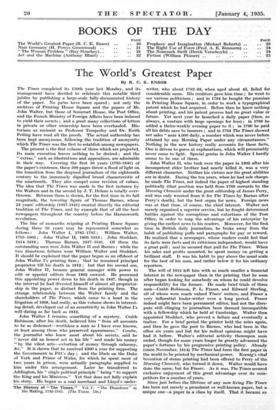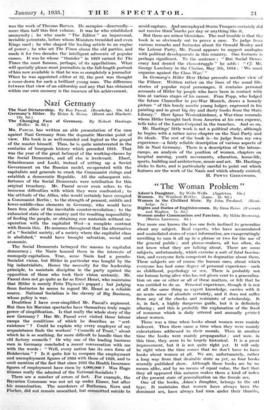The World's Greatest Paper
By R. C.
K. ENSOR
The Times completed its 150th year last Monday, and its management have decided to celebrate this notable third jubilee by publishing a large-scale fully-documented history of the paper. No pains have been spared ; not only the archives of Printing House Square and the papers of Mr. John Walter, but those of Somerset House, the Post Office, and the French Ministry of Foreign Affairs have been induced to yield their secrets ; and a great many collections of letters in private or other ownership have been overhauled. His- torians as eminent as Professor Temperley and Dr. Keith Felling have read all the proofs. The actual authorship has been kept anonymous, following the tradition of anonymity which The Times was the first to establish among newspapers.
The present is the first volume of three which are projected. Its main execution leaves nothing to be desired ; and the " extras," such as illustrations and appendices, are admirable in their way. Covering the first 56 years (1785-1841) of the paper's existence, these 500 pages throw a flood of light on the transition from the despised journalism of the eighteenth century to the immensely dignified brand characteristic of the nineteenth. They also compel some revision of values. The idea that The Times was made in the first instance by the Walters and in the second by J. T. Delane is totally over- thrown. Between them is shown, for the first time in its full magnitude, the towering figure of Thomas Barnes, whose 24 years' editorship (1817-1841) created directly the editorial tradition of The Times, and by example that of all the best newspapers throughout the country before the Harmsworth revolution.
The line of monarchs reigning at Printing House Square during these 56 years may be represented somewhat as follows : John Walter I, 1785-1795 ; William Walter, 1795-1802 ;
John Walter II, 1803-1813 ;
John Stoddart, 1814-1816 ; Thomas Barnes, 1817-1841. Of them the
outstanding men were John Walter II and Barnes ; while the two disastrous failures were William Walter and Stoddart. It should be explained that the paper began as an offshoot of John Walter I's printing firm ; that he remained principal proprietor till his death in 1812 ; but that his second son, John Walter II, became general manager with power to edit or appoint editors from 1803 onward. He possessed this appointing power down to his death in 1847, though in the interval he had divested himself of almost all proprietor- ship in the paper, as distinct from the printing firm. The strange relationship between the Walter family and the sharehOlders of The Times, which came to a head in the litigation of 1908, had really, as this volume shows in interest- ing detail, developed out of an eccentricity in John Walter I's will dating as far back as 1812.
John Walter I remains something of a mystery. Crabb Robinson, after his death, believed him " from all accounts to be as dishonest—worthless a man as I have ever known, at least among those who preserved appearances." Combe, the journalist who knew most about his secrets, said he " never did an honest act in his life " and made his money " by the vilest arts—extortion of money through calumny, &c." It is shown that he received £300 a year for supporting the Government in Pitt's day ; and the libels on the Duke of York and Prince of Wales, for which he spent most of two years in prison, were actually paragraphs supplied to him under this arrangement. Later he transferred to Addington, his " single political principle " being " to support the King and his Ministers." Yet that does not fully explain his story. He began as a coal merchant and Lloyd's under- The History of " The Times." Vol. I : " The Thunderer" in the Making, 1785-1841. (The Times. 15e.)
writer, who about 1782-83, when aged about 45, failed for considerable sums. His creditors gave him time; he went to see various politicians ; and in 1784 he bought the premises
in Printing House Square, in order to, work a typographical• patent which he had acquired. Before then he knew _nothing
about printing, and his patent process had no great value or future. Yet next year he launched a daily paper (then, as always, a venture with large openings for loss) ; in 1789 he added a thrice-weekly evening paper to it ; in 1790 he paid
all his debts save to insurers ; and in 1793 The Times showed net sales " near 4,000 daily, a number which was never before
attained by any Morning Paper under any circumstances." Nothing in the new history really accounts for these facts. One is driven to guess at explanations, which will presumably never come to light. Special genius in John Walter I hardly seems to be one of them.
John Walter II, who took over the paper in 1803 after his incompetent elder brother had nearly killed it, was a very
different character. Neither his virtues nor his great abilities are in doubt. During the ten years, when he had sole charges he made ThS Times, not indeed the paper of highest standing politically (that position was held from 1789 onwards by the Morning Chronicle under the great editorship of James Perry, and was only wrested from it for The Times by Barnes after
Perry's death), but the best organ for news. Foreign news was at that time, of course, the chief interest. Walter not merely organized a superior service, but he fought determined battles against the corruptions and extortions of the Post Office, in order to reap the advantage of his enterprise by giving the earliest news to his readers. Moreover, for the first time in British daily journalism, he broke away from the habit of publishing puffs and paragraphs for pay or reward. He realized that a newspaper, whose readers could feel that its facts were facts and its criticisms independent, would have
a great pull ; and he secured that pull for The Times, When his sales and profits mounted, he spent money on getting a brilliant staff. It was his habit to pay above the usual scale
for the best of his men, and rather below it for his ordinary reporters.
The will of 1812 left him with so much smaller a financial interest in the newspaper than in the printing that he soon after began looking for somebody on whom he could devolve responsibility for the former. He made brief trials of three men—Crabb Robinson, P. L. Fraser, and Edward Sterling,
all of whom were much valued Times' writers, and Fraser 'a very influential leader-writer over a long period. Fraser indeed might have been permanent editor, had not the -disre- pute still clinging to journalism been deemed incompatible
with a fellowship which he held at Cambridge. Walter then appointed Stoddart, who proved a failure and eventually a traitor. For a brief period the printer held the reins again,
and then he gave the .post to Barnes, who had been in the office six years and but for his radical opinions might have
had it before. Walter's editorial activity thereupon soon ended, though for some years longer he greatly advanced the paper's fortunes by his progressive printing policy. Already
(since November, 1814) The Times had been the first paper in
the world to be printed by mechanical power. Koenig's vital invention of steam printing had been offered to Perry of the
Morning Chronicle, who turned it down. Walter would have done the same, but for Fraser. As it was, The Times secured exclusive enjoyment of this great advantage over its com- petitors for a number of years.
Since just before the lifetime of any now living The Times has been not merely a prominent or well-known paper, but a unique one—a paper in a class by itself. That it became so was the work of Thomas Barnes. He occupies—deservedly- more than half this first volume. It was he who established anonymity ; he who made " The Editor" an impersonal, invisible potentate, before whom Ministers trembled and even Kings sued ; he who shaped the leading article to an engine of power ; he who set The Times above the old parties, and made it for two decades the intelligent advocate of popular causes. It was he whose "thunder" in 1829 earned for The Times the most famous, perhaps, of its appellations. What will specially please most journalists in the full-length portrait of him now available is that he was so completely a journalist When he was appointed editor at 32, the post was thought a come-down for such a brilliant young man. The difference between that view of an editorship and any that has obtained within our own memory is the measure of his achievement.







































 Previous page
Previous page